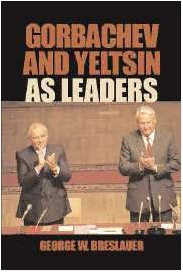Table Of ContentGorbachev and Yeltsin as Leaders
How did Gorbachev and Yeltsin get away with transforming and replacing
the Soviet system and its foreign relations? Why did they act as they did
in pushing for such radical changes? And how will history evaluate their
accomplishments? In this unique and original study, George W. Breslauer
compares and evaluates the leadership strategies adopted by Gorbachev
and Yeltsin at each stage of their administrations: political rise, political as-
cendancy, and political decline. He demonstrates how these men used the
power of ideas to mobilize support for their policies, to seize the initiative
from political rivals, and to mold their images as effective problem solvers,
indispensable politicians, and symbols of national unity and elan. Gor-
bachev and Yeltsin as Leaders also compares these men with Khrushchev
and Brezhnev, yielding new insight into the nature of Soviet and post-Soviet
politics and into the dynamics of "transformational" leadership more gen-
erally. The book is an important contribution to the analysis and evaluation
of political leadership. It is exceptionally well written and accessible to the
nonspecialist.
Professor George W. Breslauer is Dean of Social Sciences and Chancellor's
Professor of Political Science at the University of California, Berkeley. He
is an author or editor of twelve books on Soviet and Russian politics and
is Editor-in-Chief of the journal Post-Soviet Affairs. He is a member of the
Council on Foreign Relations and in 1997 won the distinguished teaching
award of the social science division of UC Berkeley.
Gorbachev and Yeltsin as Leaders
GEORGE W. BRESLAUER
University of California at Berkeley
CAMBRIDGE
UNIVERSITY PRESS
PUBLISHED BY THE PRESS SYNDICATE OF THE UNIVERSITY OF CAMBRIDGE
The Pitt Building, Trumpington Street, Cambridge, United Kingdom
CAMBRIDGE UNIVERSITY PRESS
The Edinburgh Building, Cambridge CB2 2RU, UK
40 West 20th Street, New York, NY 10011-4211, USA
477 Williamstown Road, Port Melbourne, vie 3207, Australia
Ruiz de Alarcon 13, 28014 Madrid, Spain
Dock House, The Waterfront, Cape Town 8001, South Africa
http://www.cambridge.org
© George W. Breslauer 2002
This book is in copyright. Subject to statutory exception and
to the provisions of relevant collective licensing agreements,
no reproduction of any part may take place without
the written permission of Cambridge University Press.
First published 2002
Printed in the United States of America
Typeface Sabon 10/13 Pc- System AMS-TX [FH]
E
A catalog record for this book is available from the British Library.
Library of Congress Cataloging in Publication Data
Breslauer, George W.
Gorbachev and Yeltsin as leaders / George W. Breslauer.
p. cm.
Includes bibliographical references and index.
ISBN 0-521-81486-3 — ISBN 0-521-89244-9 (pbk.)
1. Soviet Union —Politics and government —1985—1991. 2. Russia (Federation) — Politics
and government — 1991— . 3. Gorbachev, Mikhail Sergeevich, 1931— . 4. Yeltsin, Boris
Nikolaevich, 1931— . I. Title.
DK288.B74 2002
947.08 5'4-dc21 2001052443
ISBN o 521 81486 3 hardback
ISBN o 521 89244 9 paperback
/ dedicate this book to my wife, Yvette Assia Breslauer, my daughter,
Michelle, my son, David, my mother, Marianne Schaeffer Breslauer,
and the memory of my father, Henry Edward Breslauer.
Contents
Preface page ix
1 Leadership Strategies in Soviet and Post-Soviet Politics i
2 Gorbachev and Yeltsin: Personalities and Beliefs 22
3 The Rise of Gorbachev 41
4 Gorbachev Ascendant 59
5 Gorbachev on the Political Defensive 79
6 Yeltsin versus Gorbachev 108
7 Yeltsin Ascendant 141
8 Yeltsin on the Political Defensive 174
9 Yeltsin Lashes Out: The Invasion of Chechnya (December 1994) 196
10 Yeltsin's Many Last Hurrahs 214
11 Explaining Leaders' Choices, 198 5-1999 231
12 Criteria for the Evaluation of Transformational Leaders 262
13 Evaluating Gorbachev as Leader 271
14 Evaluating Yeltsin as Leader 295
Index 319
Preface
This book is about two men - Mikhail Gorbachev and Boris Yeltsin - who
presided from 1985—1999 over the tumultuous transition from Soviet to post-
Soviet politics. The speed of change during the first half of that period was
remarkable. In 1985, the Soviet Union appeared to be an entrenched entity, ca-
pable of defending itself against all challenges to the Communist Party's right
to rule at home and in Eastern Europe, and determinedly pursuing a policy
of great-power competition abroad. By the end of 1987, glasnost' had bro-
ken out, the public media were increasingly challenging old doctrines, and the
Soviet leadership was starting to make one-sided concessions to the United
States on fundamental issues of national security. By the end of 1989, rela-
tively free elections had taken place, Party officials were being voted out of
office, communism had collapsed in Eastern Europe, the Soviet Army had re-
treated in defeat from Afghanistan, and the Cold War was coming to an end.
By the end of 1991, an oppositional figure had been elected president of Rus-
sia, both communism and the Soviet Union had collapsed, and independent
Russia had emerged as a seemingly helpless supplicant of the West. By the
end of 1993, independent Russia had experienced two wrenching years of po-
litical and economic turmoil at home and was coming to realize the limits of
Western willingness to assist its transition from communism. If one had gone
to sleep in Moscow in 1985-1986 and woken up in 1992-1993, the change
would have been unfathomable.
Without presupposing that Gorbachev and Yeltsin made all these things
happen, it is fair to say that things would have happened quite differently had
different individuals been in charge. Their acts of leadership were crucial.
Both men will surely go down in history as having left a major mark on their
country's condition as it approached the twenty-first century. The questions

